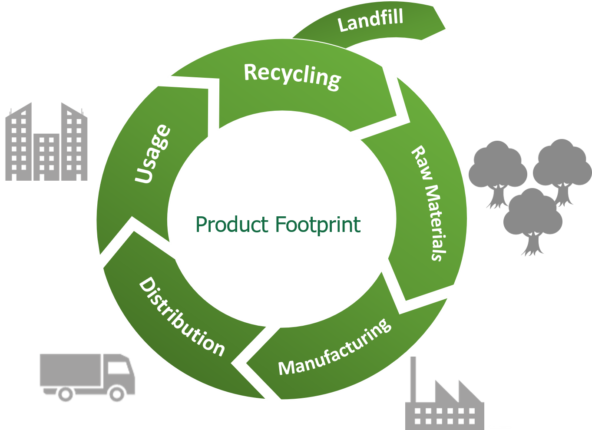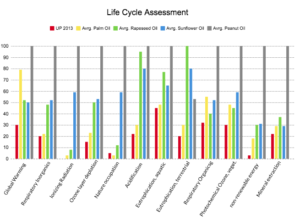
1.Which vegetable oil is the most environment-friendly?
Palm oil is the most sustainable crop with a fully certified supply chain. It is the crop with the highest yield per hectare: 3.8 tonnes vs. 0.8 for rapeseed and 0.7 for sunflower and with the best life cycle assessment.
2. What do you mean with ‘Life Cycle Assessment’?
Life cycle assessment (LCA) is a method used to evaluate environmental impacts associated with the various stages of a product, ranging from the extraction of raw materials, going through the processing and distribution phases to end with the final product.
United Plantations Berhad (Indonesia) has carried out a study to analyze the life cycle of different oils. UP’s production of palm oil has been compared with industry averages of four other vegetable oils which are widely used in the food industry:
- Palm oil (Malaysia/Indonesia);
- Rapeseed oil (Europe);
- Sunflower oil (Ukraine),
- Peanut oil (India).
The analysis took into consideration relevant parameters such as:
- Global Warming;
- Respiratory Inorganics;
- Ionizing Radiation;
- Ozone Layer Depletion;
- Nature Occupation;
- Acidification – emission of nitrogen oxides (NOx), sulfur oxides (SOx) and ammonia (NH3);
- Eutrophication;
- Respiratory Organics;
- Photochemical Ozone -measurement of atmospheric pollutants released in kg of ethylene C2H6 eq;
- Non-renewable energy;
- Mineral Extraction.

3. What were the results of the analysis?
As you can see from the comparative results above, it appears that palm oil – especially the one of United Plantations – performs better than all the other oils for all impact categories. What is more, in categories such as Respiratory Inorganic, Ozone Layer Depletion and Acidification, palm oil appears to have less than half the impact on the environment. that its direct competitors – rapeseed and sunflower oils.
4. What does this research tell us?
Companies that have boycotted palm oil are moved by commercial reasons, desperate to capture more consumers in a stagnant market. Boycotting palm oil to save the environment is a lie, as we just saw. Science, facts, and reality show that, at the moment, there is not a single alternative to palm oil. Moving away from palm oil would mean total chaos: the impoverishment of local population and environmental disaster. We must, therefore, work to achieve greater sustainability of the supply chain. We have no alternative.
